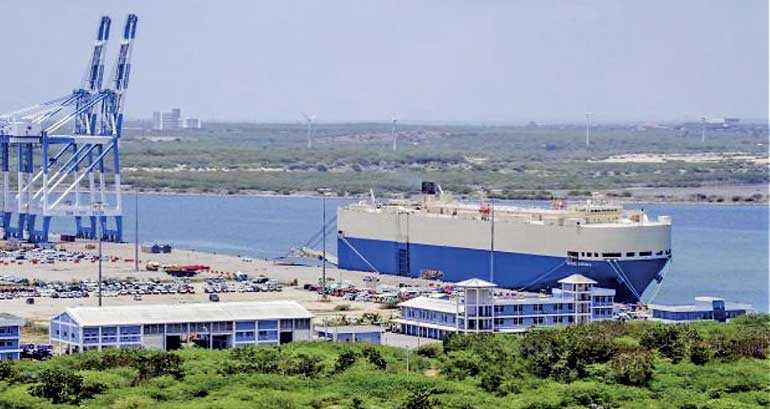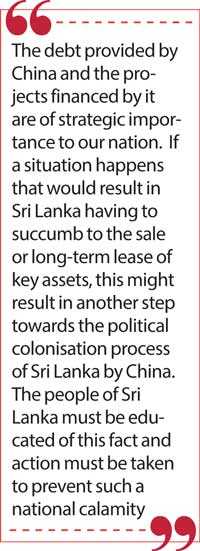Wednesday Feb 25, 2026
Wednesday Feb 25, 2026
Tuesday, 27 October 2020 00:41 - - {{hitsCtrl.values.hits}}

It is clear that China has resorted to financing infrastructure projects with the intention of claiming them in the case of default. This was the fate of the Hambantota Port that was surrendered to avoid default on the loans from China
 Sri Lanka has yet again resorted to seeking the help of China to avert a possible default on her debt obligations. Populist policies, lack of a long-term plan and unpatriotic motives, led by decades of impoverished political leadership, has placed Sri Lanka as one of the most financially vulnerable countries in the world.
Sri Lanka has yet again resorted to seeking the help of China to avert a possible default on her debt obligations. Populist policies, lack of a long-term plan and unpatriotic motives, led by decades of impoverished political leadership, has placed Sri Lanka as one of the most financially vulnerable countries in the world.
Recent events with the spread of the COVID-19 pandemic has also meant that the country has now been stranded in a mountain of debt with no short-term remedy on offer than to borrow more to survive. However, the primary concern has been lately diverted to the potential broader influence of China into the day-to-day affairs of Sri Lanka.
As expected, the Chinese lauding the SLPP Government has resorted to the help of their godfather in a bid to save the day for the country. This action is in contrary to pursuing an IMF bailout or seeking a loan moratorium. At the moment of writing this article, the Government of Sri Lanka is in negotiation with China for another $ 500 m loan to provide urgent budgetary support.
The involvement of China is also expected to grow with the re-election of the Rajapaksa family-led Sri Lanka Podujana Peramuna (SLPP). President Mahinda Rajapaksa and his Government enjoyed a strong relationship with China which eventually resulted in numerous Chinese-led initiatives in Sri Lanka.
The tactical involvement of China in Sri Lanka has resulted in many concerns raised by other friendly nations of Sri Lanka such as India. Further, the lack of political foresight of the Mahinda Rajapaksa Government has surrendered China a strong position of influence within the region via Sri Lanka.
China has a long history of dealings with Sri Lanka, from the times of their relations as global traders, a few centuries ago. However, they have never been as impactful as what is witnessed in the recent past.
Most Chinese infrastructure loans obtained by the Mahinda Rajapaksa Government have resulted in low return yielding projects that cumulatively are yet to provide their expected contribution to the economy. Some projects such as the Hambantota Airport and Convention Centre constantly depict the state of abandoned property. The true reason for the construction of such idle plans might never be known, however, the debt problems left by such developments would remain a burden for the next few decades to come.
The problem with the recent Chinese loans is that they have resulted in funding key infrastructure projects under strict conditions, such as hiring of pre-planned contractors to whom most of the loan proceeds are ultimately rewarded. Further, some of those developments are frequently under maintenance, while some of the others are left idle with minimum or no footfall.
Despite this, China continues to reiterate their strong collaboration with Sri Lanka and indicate that no country in its Belt and Road initiative have fallen into the debt trap. The Chinese-lauding SLPP-led Government also supports this notion that developments financed by China have been fruitful.
It is frequently perceived that the Chinese-led initiatives were shrewdly crafted in a manner that was able to exploit the flimsy family-led political leadership of that time. The established dictatorship style driven leadership of the UPFA during 2005-2015 was not able to clearly understand the feasibility of such lavish infrastructure that the Chinese was keen to fund. In addition, they were not able to foresee the repercussions of such loans would have in the future, given the low performance of the developments. 
Today, these projects have become national burdens and perception rests that China is planning to gain a strong foothold in Sri Lanka via these unsuccessful projects. China already controls the Hambantota Port that was leased out to them for the long term by the Yahapalana Government as means of paying back the project loan. The Chinese also have a share of the reclaimed land in the Port City project in Colombo. These are two strategic locations from which the Chinese can conspicuously mark their presence in the region.
The strong political footing in Sri Lanka by China was not a sudden occurrence. This was a result of bad policy decisions, selfishness of the people and depleted political leadership of the country over a number of years.
Chinese loans are also not the only reason for the dire state of financial affairs the country now has been left to mitigate. The debt trap faced by Sri Lanka was driven by years of prioritising short-term whims and fancies of the people ahead of the more long-term growth and stability initiatives for the country. Such reasons have embroiled the country into this poor state that it now struggles to resuscitate.
This has made Sri Lanka a pawn for a super power such as China to manoeuvre to an extent of transcending the nation to a state of a political colony. Despite the opposing rhetoric by intellectuals, the above statement is a fact and people must act now to avert this national calamity of drifting towards a situation of being a political colony of a foreign super power.
How did Sri Lanka fall into this state?
1. Illiterate voters and pampered population
Voters have been driven by emotions, when deciding on the political leadership of the country. Voters have always selected candidates and favoured weakened policies that present concessions, freebies and tax breaks with an array of over-ambitious short-term goals. The term “illiterate” is ideally suited to be placed among most voters as they cannot discover the adverse impact of what such populist measures would have on the country irrespective of their selfish desires.
Further, such voters are mostly deceived by slogans of misguided patriotism that resemble the true failure of the democratic process as a system in which the voters do not know whom to vote. The re-election of a Rajapaksa-led administration is a good example of such a failure in the system.
The education system of Sri Lanka is mainly a memory-driven learning process that impedes the learning of any creative and problem solving skills. As a result most of the population and businesses have positioned the Government as a fatherly figure that must provide jobs, concessions, incentives and essential necessities such as free healthcare and education. In addition, the Government must come into their aid when they fall into despair, even as a result of their bad decisions.
The self-dependence culture that is needed among a dynamic population of a country to prosper is lacking in Sri Lanka. This is much to the detriment of the economy, as most expenditure has to be devoted to social welfare expenditure and concessions that continue to grow after each election. Such expenditures are consumption based and do not provide a return for the Government. The Government has to constantly borrow to meet these expenses and further borrow to pay of those borrowings.
Sri Lanka encompasses a financial literacy level of between 30-35%, which is very poor for a country to progress ahead. As long as financial literacy remains poor, most segments of the population including graduates will fall prey to the bogus political rhetoric.
Election manifestos are documents that create fiscal imbalances with high expenses being proposed by way of concessions, and low revenues by way of tax concessions. Most of the time, such measures are inculcated in the manifesto to ensure that they could sabotage the minds of the most financially weak population segments of this country. Unfortunately, such segments form the majority.
The incumbent Government is a clear example of a group of politicians that presented innumerable promises and implemented sweeping tax cuts that have placed the country at the brink of financial default. At present so-called self-proclaimed bogus heroes have been made to plead for a bailout from China in a bid to prevent a financial tragedy.
The equation towards financial security is quite simple, which is revenue > expenses. Since, revenue is less than expenses, the Government has to borrow or sell some of its assets to bridge the gap, and sadly that is what has been happening for a few decades now.
The first step in the right direction is the setup of a mechanism in which the people have to pay their rightful share of taxes at some point to supplement the benefits provided by the Government for them. Most politicians are afraid to propose such measures in a bid to prevent public anger. Either way if revenue cannot be increased via taxes, then Government expenses have to stop via cuts on social welfare programs or infrastructure expenses. Further, expenses devoted towards maintaining the elected politicians and ministers must also be slashed.
Sri Lankan taxes are mostly obtained indirectly via taxes inserted on goods and services. This method is quite disadvantageous to the most underprivileged population of the country as they will pay the same share of taxes as the high income earners that mostly utilise Government provided services and resources.
2. Inability to continuously implement a long-term plan
Sri Lanka is one country that still lacks the ability to develop a progressive long-term plan towards development. Each time the government changes, a new plan also follows suit. We have become a country without a vision and a direction.
Most policies that get implemented are populist consumption-driven policies that provide no return to the country. Politicians have been made to place such policies forward as a measure to retain office. Even to date there is no proper policy framework for SME development or entrepreneurship development, which is a vital component to drive a country’s growth prospect.
Driving innovation, exports, entrepreneurship and technology should be at the foremost position of any policy framework. However, the Government-dependent culture of our people have meant that most policies have to rest in providing incentives and public sector jobs prior to any development measures. Even the development measures that are also implemented are under severe duress to meet the political needs of the politicians and their electorates.
3. Rogue political leadership
The ultimate negative repercussion, much to the detriment of this nation, has been the inability to nurture and elect astute politicians. Contemporary politicians witnessed today invent numerous ways to make their case for governance.
Modern-day politics has become a game of money, thuggery, corruption and narcotics. Common allegations of large-scale corruption, mismanagement and nepotism are at the forefront of the political sphere at this moment. As a result the qualified and educated individuals stay away from politics and some migrate overseas out of despair.
At the last Presidential Election, we witnessed the impact of a professional movement that played a key role in getting the incumbent Government to power. Such professional movements have been made to become vocally and operationally redundant. This is a clear indication of how politicians can manipulate even the most qualified professionals to find them a place in office. Some politicians even went to the extent of creating scenes of supernatural interventions to exploit the weak-hearted guiltless voters.
4. Lack of entrepreneurship
Entrepreneurship is the nucleus of a country’s growth. The breadth of entrepreneurship is around 6-10% of our nation’s population. Further, when it comes to building businesses that could compete with global markets, the number falls to between 2-3%.
Much research conducted in this field highlights numerous reasons for this debacle, including the lack of self-dependency among our people, strong care taker role of the government, risk averseness of the people and affiliate-driven employee driven mindset of our people.
If our country cannot create entrepreneurs and businesses that cannot compete globally, that notion itself spells doom for a nation. Sri Lanka has been running a trade deficit for a long time and shows no sign of decline in the near term, as we have become an import dependent nation.
During the initial phase of the COVID-19 lockdown witnessed during March this year, we witnessed numerous innovations, much to the delight of many. However, the lack of a commercialisation framework for such initiatives have meant that such innovations struggle to find a firm footing in the market.
Education systems must be built to teach entrepreneurship, financial literacy and in the modern world and STEM (Science, Technology, Engineering and Mathematics) subjects to gain a global footing among the most demanded professions and businesses in World.
Conclusion
Sri Lanka will need to pay out a large sum of borrowings in the future years to come. The way things are transpiring, the situation will persist for a long time. This is a result of budgetary deficits and the resulting need for more loans to finance the deficit.
Depleting avenues to finance the debt would mean that Sri Lanka would need to resort to the sale of assets or forward a begging bowl to a super power such as China for help. Sri Lanka cannot contend with the notion that any super power would come to the aid of Sri Lanka to provide a loan moratorium or a haircut. This is evident with the actions of both India and China. The final result would be to concede critical infrastructure or assets via sale or lease to a super power to repay the due loans.
It can be clearly perceived that China has resorted to financing infrastructure projects with the intention of claiming them in the case of default. This was the fate of the Hambantota Port that was surrendered to avoid default on the loans from China.
The debt provided by China and the projects financed by it are of strategic importance to our nation. If a situation happens that would result in Sri Lanka having to succumb to the sale or long-term lease of key assets, this might result in another step towards the political colonisation process of Sri Lanka by China. The people of Sri Lanka must be educated of this fact and action must be taken to prevent such a national calamity.
[The writer is the Managing Director at Elon Venture Catalysts (Pvt) Ltd., a data analytics & investment banking services firm operating in Sri Lanka. He has a BEng (Hons) in Chemical Engineering degree from the University of Nottingham, United Kingdom and a MBA (Marketing) from the University of Colombo. He is also a Chartered Financial Analyst. Vidushan holds a Certified Management Accountant (Australia) and Certified Global Business Analyst (Australia). He is currently reading for his Doctorate in Business Administration from the University of Colombo. He can be reached via email on [email protected]]